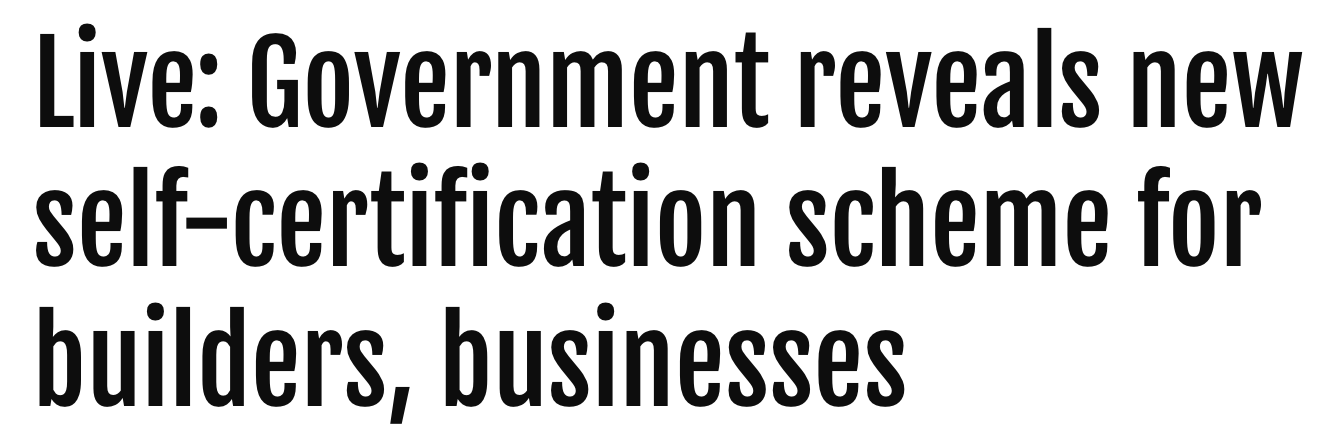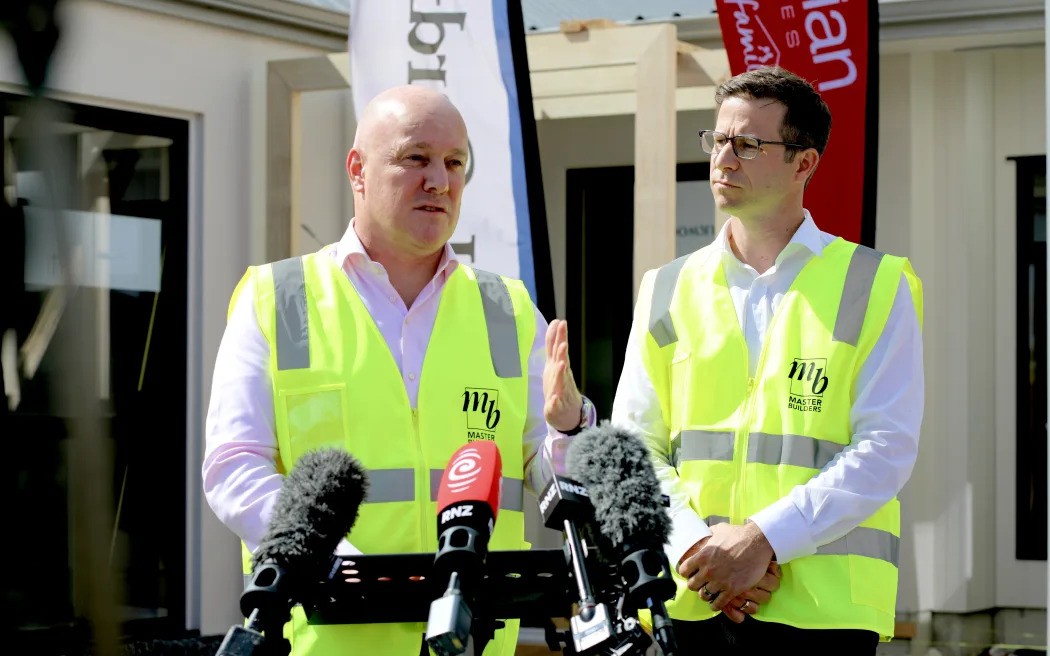Christopher Luxon and Chris Penk provide an update on building consent changes, at a briefing in Auckland. Photo: RNZ / Marika Khabazi
题图:Christopher Luxon 和 Chris Penk 在奥克兰的一次简报会上提供了有关建筑许可变更的最新情况。 摄影:RNZ / Marika Khabazi
What you need to know
您需要了解的内容
- Prime Minister Christopher Luxon and Building and Construction Minister Chris Penk are speaking at a news conference in Pukekohe, Auckland.
总理克里斯托弗·卢克森(Christopher Luxon)和建筑与施工部长克里斯·彭克(Chris Penk)在奥克兰普基科希(Pukekohe)举行的新闻发布会上发表讲话。 - Building professionals will be able to self-certify their work through a new opt-in scheme, the Government announced on Tuesday.
政府周二宣布,建筑专业人士将能够通过一项新的选择加入计划对他们的工作进行自我认证。 - Luxon said it was a part of a range of measures to make it more affordable to build houses.
卢克森说,这是一系列措施的一部分,旨在使建造房屋更加负担得起。
Building professionals will be able to self-certify their work through a new opt-in scheme Building and Construction Minister Chris Penk has announced in efforts to cut out council inspectors, speed-up construction work, and cut down costs for consumers.
【澳纽网编译】建筑专业人士将能够通过一项新的选择加入计划对他们的工作进行自我认证,建筑和施工部长彭克( Chris Penk )宣布,将努力减少议会检查员,加快施工工作,并降低消费者的成本。
【澳纽网编译】建筑专业人士将能够通过一项新的选择加入计划对他们的工作进行自我认证,建筑和施工部长彭克( Chris Penk )宣布,将努力减少议会检查员,加快施工工作,并降低消费者的成本。
广告 | Advertisement
在澳纽网做广告 | Advertise with us

“The building consent system is intended to protect homeowners from defective building work by requiring work to be inspected and consented by a Building Consent Authority. But the regime is inefficient and adds cost and time to the build process, which makes it harder for Kiwis to realise their dream of homeownership,” Penk said in a statement.
“建筑许可系统旨在通过要求建筑许可机构检查和许可工作,保护房主免受建筑工程缺陷的影响。但该制度效率低下,并增加了建造过程的成本和时间,这使得新西兰人更难实现他们拥有房屋的梦想,“彭克在一份声明中说。
“It takes on average 569 days for a home be built and consented – amid a housing shortage, that is simply too long to wait.”
“建造房屋并获得许可平均需要 569 天——在住房短缺的情况下,这实在是太长了。”
Penk’s plan is to develop a new opt-in certification scheme for trusted building professionals and accredited businesses. The scheme has two pillars: the first allows qualified building professionals, such as plumbers, drainlayers and builders, to self-certify their own work, for low-risk builds, without the need for an inspection. “This brings them in line with electricians and gasfitters who can already do this and is something the industry has been calling for, for years,” Penk said.
Penk 的计划是为值得信赖的建筑专业人士和经认证的企业制定一项新的选择加入认证计划。该计划有两大支柱:第一大支柱允许合格的建筑专业人士,如水管工、排水工和建筑商,对自己的工作进行自我认证,用于低风险建筑,无需检查。“这使他们与已经可以做到这一点的电工和燃气安装工保持一致,这是该行业多年来一直在呼吁的,”Penk 说。
广告 | Advertisement
在澳纽网做广告 | Advertise with us
“The second pillar allows businesses with a proven track-record – for example, group homebuilders who build hundreds of near identical homes a year – to go through a more streamlined consent process.
“第二个支柱允许具有良好业绩记录的企业——例如,每年建造数百套几乎相同的房屋的团体住宅建筑商——通过更简化的许可流程。
“At the moment, a single-story basic home might go through 10 or more separate inspections. This is clearly too many and the cost-benefit has become unbalanced.
“目前,单层基本住宅可能会经过 10 次或更多次单独检查。这显然太多了,成本效益变得不平衡。
“Building professionals are already subject to quality assurances such as requirements to be registered and hold a practicing license; keep records of their work; and have their details held in a publicly searchable database. However, as part of the scheme’s design there will be additional safeguards including:
“建筑专业人士已经受到质量保证的约束,例如要求注册并持有执业执照;保存他们的工作记录;并将他们的详细信息保存在一个可公开搜索的数据库中。但是,作为该计划设计的一部分,将有额外的保障措施,包括:
- a clear pathway that customers can access to remedy poor work,
客户可以获得补救不良工作的明确途径, - strengthened qualification requirements for building professionals, and
加强了对建筑专业人员的资格要求,以及 - strict disciplinary actions for careless or incompetent self-certifiers
对粗心或不称职的自我证明者采取严厉的纪律处分
“The self-certification scheme will be restricted to low-risk, basic residential dwellings. We know from international evidence that most defective building work happens in complex large developments – we want inspectors to focus their resources on this kind of work.
“自我认证计划将仅限于低风险的基本住宅。我们从国际证据中了解到,大多数有缺陷的建筑工作发生在复杂的大型开发项目中——我们希望检查员将他们的资源集中在这类工作上。
“自我认证计划将仅限于低风险的基本住宅。我们从国际证据中了解到,大多数有缺陷的建筑工作发生在复杂的大型开发项目中——我们希望检查员将他们的资源集中在这类工作上。
广告
Advertise with us
“Under the current consent settings, councils and their ratepayers are liable for all defective work. This naturally creates a highly conservative approach to consenting, which further slows the process. A model where building practitioners shoulder more of the risk should incentivise better quality work and lower the liability risk for ratepayers.
“在目前的许可设置下,市议会及其纳税人应对所有有缺陷的工作负责。这自然会产生一种高度保守的许可方法,从而进一步减慢了这一过程。建筑从业者承担更多风险的模式应该会激励更高质量的工作,并降低纳税人的责任风险。
“We will make detailed policy decisions in the new year following thorough consultation, which will consider what residual role existing Building Consent Authorities should have in the self-certification scheme, for example through an auditing function.
“我们将在经过全面磋商后,在新的一年做出详细的政策决定,这将考虑现有的建筑许可机构在自我认证计划中应该发挥哪些剩余作用,例如通过审计职能。”
“Kiwis need confidence in the safety and quality of their homes, but it’s possible to do this through a more streamlined assurance pathway. We are committed to cutting through the tangle of red tape so that we can get more Kiwis into the quality homes they deserve.”
“新西兰人需要对自己家的安全和质量有信心,但可以通过更简化的保证途径来做到这一点。我们致力于消除繁文缛节的混乱,以便我们能够让更多的新西兰人获得他们应得的优质住房。
来源:Stuff
741 views






